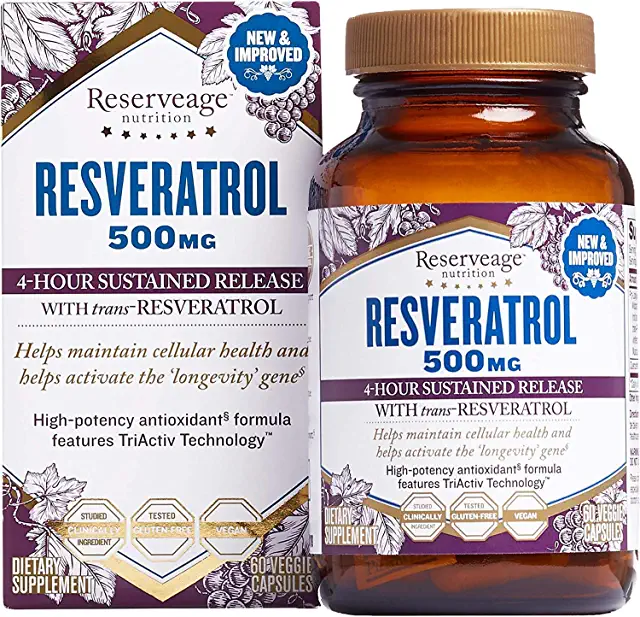What is Resveratrol? It is a natural compound with powerful antioxidant properties.
Wondering what it is and how it can benefit your health? Resveratrol is a natural compound found in certain plants, including grapes, peanuts, and berries. It has gained attention for its potential health benefits, particularly its antioxidant properties. In this post, we’ll explore what it is and how it may be beneficial for your health.

Benefits of Resveratol
What is Resveratol and What Does it Do?
Resveratrol is a natural compound that belongs to a group of plant compounds called polyphenols. It is found in the skin of red grapes, peanuts, and berries, and is produced by plants in response to stress, injury, or fungal infection. It has gained attention for its potential health benefits, particularly its antioxidant properties, which may help protect against chronic diseases such as cancer, heart disease, and Alzheimer’s disease.
Polyphenols are a group of naturally occurring compounds found in plants that have antioxidant properties and are believed to have numerous health benefits. Resveratrol is a type of polyphenol found in red wine, grapes, and some berries, and has been studied for its potential anti-aging and disease-fighting properties.
Sources of Resveratrol
Resveratrol is found in a variety of plant-based foods, with the highest concentrations found in the skin of red grapes. Other sources include peanuts, blueberries, cranberries, and dark chocolate. While red wine is often touted as a source of resveratrol, the amount found in wine is relatively small and should not be relied upon as a primary source of the compound.

Health Benefits of Resveratrol
Resveratrol has been shown to have a number of health benefits, primarily due to its powerful antioxidant properties. Antioxidants help to protect the body from damage caused by free radicals, which are unstable molecules that can damage cells and contribute to the development of chronic diseases. Resveratrol has been linked to a reduced risk of heart disease, cancer, and Alzheimer’s disease, as well as improved blood sugar control and anti-inflammatory effects. However, more research is needed to fully understand the potential health benefits of resveratrol and how it works in the body.
Antioxidant Properties of Resveratrol
Resveratrol is a natural compound found in certain plants, including grapes, berries, and peanuts. It is known for its powerful antioxidant properties, which help to protect the body from damage caused by free radicals. Free radicals are unstable molecules that can damage cells and contribute to the development of chronic diseases. It has been shown to have a number of health benefits due to its antioxidant properties, including a reduced risk of heart disease, cancer, and Alzheimer’s disease, as well as improved blood sugar control and anti-inflammatory effects. However, more research is needed to fully understand the potential health benefits of resveratrol and how it works in the body.

Skin Anti-Aging Effects
Resveratrol has been shown to have anti-aging benefits for the skin, including reducing the appearance of fine lines and wrinkles, improving skin texture and tone, and protecting against environmental damage. It can also help to brighten the skin and reduce inflammation by helping to protect the skin from damage caused by free radicals and UV radiation. Additionally, it may help boost collagen production, which can improve the overall appearance and texture of the skin.
Resveratrol can be found in some wrinkle creams and other skincare products. However, it is important to note that it’s effectiveness in topical skincare products is still being studied and debated in the scientific community. Some studies have shown promising results, while others have found little to no benefit. It is also important to choose a product with a high enough concentration of resveratrol to potentially see any benefits. It may be more beneficial to consume it through food or supplements for overall health benefits.

Additional Benefits
Resveratrol May Help Improve Iron Absorption
Studies have shown that resveratrol, a compound found in red wine and grapes, may help improve iron absorption in the body. However, more research is needed to fully understand the effects of resveratrol on iron absorption and overall health.
Omega 3s and Resveratrol
There is some evidence to suggest that resveratrol, a compound found in red wine and grapes, may enhance the absorption of omega-3 fatty acids. However, more research is needed to fully understand the potential benefits and risks of combining these two supplements. It is always best to consult with a healthcare professional before starting any new supplement regimen.
Potential Risks and Side Effects
There is no official recommended daily intake of resveratrol, but most studies have used doses ranging from 150 mg to 445 mg per day. However, it is important to note that high doses may cause side effects and interact with certain medications, so it is best to consult with a healthcare professional before taking any supplements.
While it is generally considered safe when consumed in small amounts through food sources, there is limited research on the long-term effects of taking high doses of resveratrol supplements. Some studies have suggested that high doses of resveratrol may interact with certain medications or have negative effects on the liver. Additionally, these supplements are not regulated by the FDA, so it is important to speak with a healthcare provider before taking any supplements. As with any supplement or medication, it is important to weigh the potential benefits against the potential risks and side effects.
More, What is Resveratrol?
Who should not take it?
While resveratrol is generally considered safe for most people, there are some groups who should avoid taking it. These include pregnant or breastfeeding women, children, and people taking certain medications, such as blood thinners or immunosuppressants. It’s always best to consult with a healthcare professional before starting any new supplement.

How much resveratrol is in a glass of red wine?
The amount of resveratrol in a glass of red wine can vary depending on the type of wine and how it was produced. On average, a 5-ounce glass of red wine contains between 0.2 and 2 milligrams of resveratrol. However, studies have shown that you would need to drink several bottles of red wine per day to get the amount needed to see health benefits.
Where does it come from?
It is a natural compound found in the skin of grapes, blueberries, raspberries, and mulberries. It is also found in red wine, peanuts, and some herbs like Japanese knotweed. Wildcrafted Japanese Knotweed Extract is a natural source of resveratrol, a powerful antioxidant that has been linked to numerous health benefits.
It is often included in resveratrol supplements because it is a potent source of this beneficial compound. Japanese Knotweed is a plant that is native to Asia but has spread to other parts of the world, including North America and Europe. It has been studied for its potential health benefits, including anti-inflammatory and antioxidant properties.
Which resveratrol is best?
The best supplements are those that are made with high-quality, pure ingredients and have been third-party tested for potency and purity. Some top-rated options include Resveratrol 500mg by Nature’s Bounty, Reserveage Nutrition Resveratrol 500mg, and NOW Foods Natural Resveratrol. It’s important to consult with a healthcare professional before starting any new supplement regimen.
Can it cause hair loss?
There is no evidence to suggest that it causes hair loss. In fact, some studies have suggested that resveratrol may actually promote hair growth by increasing blood flow to the scalp and stimulating hair follicles. However, more research is needed to fully understand the effects of it on hair health.

In Conclusion
In conclusion, Resveratrol a compound found in red wine, grapes, and some berries, has been linked to numerous health benefits. It has been shown to have anti-inflammatory and antioxidant properties, which may help protect against heart disease, cancer, and Alzheimer’s disease. It may also improve insulin sensitivity and lower blood sugar levels, making it potentially beneficial for those with diabetes. However, more research is needed to fully understand the effects of it on human health.
Read about physical and mental health here.
ADD ADHD Alzheimers antioxidants arthritis Best Sources of Omega 3 6 9 Fatty Acids cancer exercise fatty acids fatty fish fermented foods fish oil flax seed oil health benefits healthy diet Healthy Lifestyle healthy lifestyle benefits healthy lifestyle food Healthy Weight loss heart disease herring hummus indoor herb garden grow light indoor herb garden kits indoor herb garden on wall indoor herb garden planters jackfruit joint stiffness mackerel meditation mental health mushrooms oily fish omega-3 omega-3 fatty acids omega 3 6 9 risks and side effects Omega3tips.com salmon sardines super foods tuna unplug vitamins Weight loss wellness
Inositol is a type of sugar alcohol that is naturally found in many foods, including fruits, beans, grains, and nuts. It has been shown to have several health benefits, including improving insulin sensitivity, fertility, reducing anxiety and depression symptoms, and promoting healthy hair growth.



